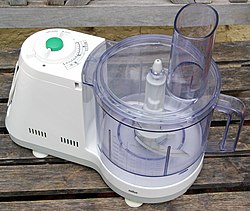| Revision as of 01:17, 24 September 2006 edit124.180.240.87 (talk) →See also← Previous edit | Revision as of 01:18, 24 September 2006 edit undoJohn254 (talk | contribs)42,562 editsm JS: Reverted edits by 124.180.240.87 to last version by 66.244.202.69Next edit → | ||
| Line 22: | Line 22: | ||
| ] developed the food processor in the early 1970s, adapting the design from an industrial ]. In 1973, this first home food processor was introduced in North America as the ]. Cuisinart remains one of the most successful food processor brands. | ] developed the food processor in the early 1970s, adapting the design from an industrial ]. In 1973, this first home food processor was introduced in North America as the ]. Cuisinart remains one of the most successful food processor brands. | ||
| ==See also== | |||
| *] | *] | ||
| *] | *] | ||
Revision as of 01:18, 24 September 2006

A food processor is a kitchen appliance used to facilitate various repetitive tasks in the process of preparation of food. Today, the term almost always refers to an electric-motor-driven appliance, although there are some manual devices also referred to as "food processors".
Food processors are similar to blenders in many ways. The primary difference is that food processors use swappable blades and disks (attachments) instead of a fixed blade. Also, their bowls are wider and shorter, a more appropriate shape for the solid or semi-solid foods usually worked in a food processor. Usually little or no liquid is required in the operation of the food processor unlike a blender, which requires some amount of liquid to move the particles around its blade.
Its functions normally consist of:
- Slicing/chopping vegetables
- Grinding items such as nuts, meat, or dried fruit
- Shredding or Grating cheese or vegetables
- Pureeing
- Mixing and kneading doughs
Design and operation
The base of the unit houses a motor which turns a vertical shaft. A bowl, usually made of transparent plastic, fits around the shaft. Cutting blades can be attached to the shaft; these fit so as to operate near the bottom of the bowl. Shredding or slicing disks can be attached instead; these spin near the top of the bowl. A lid with a "feed tube" is then fitted onto the bowl.
The feed tube allows ingredients to be added while chopping, grinding or pureeing. It also serves as a chute through which items are introduced to shredding or slicing disks. A "pusher" is provided, sized to slide through the feed tube, protecting fingers.
Almost all modern food processors have safety devices which prevent the motor from operating if the bowl isn't properly affixed to the base or if the lid isn't properly affixed to the bowl.
History
Carl Sontheimer developed the food processor in the early 1970s, adapting the design from an industrial blender. In 1973, this first home food processor was introduced in North America as the Cuisinart. Cuisinart remains one of the most successful food processor brands.
See also
External links
- Choosing a Food Processor
- Inventor Carl Sontheimer
- Cuisinart Web Site
- Howstuffworks "How Food Processors Work"